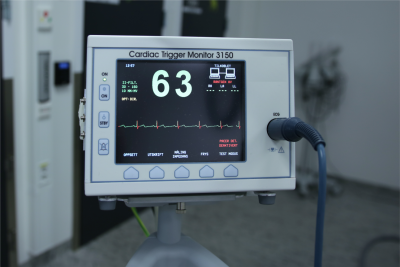The tests a patient needs to diagnose his or her heart disease depends on what condition his or her doctor thinks he or she might have. No matter what type of heart disease a patient has, the doctor will likely perform a physical exam and ask about personal and family medical history before doing any tests. Besides blood tests and a chest X-ray, tests to diagnose heart disease can include:
Electrocardiogram (ECG): An ECG records electrical signals and can help a doctor detect irregularities in a patient’s heart rhythm and structure. A patient may have an ECG while he or she is at rest or while exercising (stress electrocardiogram).
Holter monitoring: A Holter monitor is a portable device worn to record a continuous ECG, usually for 24 to 72 hours. Holter monitoring is used to detect heart rhythm irregularities that aren't found during a regular ECG exam.
Echocardiogram: An echocardiogram is a noninvasive test that uses sound waves to evaluate the heart's chambers and valves, as well as its pumping function. The echo sound waves create an image on the monitor as an ultrasound probe is passed across the skin over the heart.
Stress test: This test is done to monitor the heart while the patient walks on a treadmill or pedal a stationary bike. The doctor also monitors the patient’s breathing and blood pressure. A stress test may be used to detect coronary artery disease, or to determine safe levels of exercise after a heart attack or heart surgery. This test can also be done using special medicines that stress the heart in a similar manner as exercise does.
Cardiac catheterization: In this test, a short tube (sheath) is inserted into a vein or artery in the leg (groin) or arm. A hollow, flexible and longer tube (guide catheter) is then inserted into the sheath. Aided by X-ray images on a monitor, the doctor threads the guide catheter through that artery until it reaches the heart.
The pressures in the heart chambers can be measured, and dye can be injected. The dye can be seen on an X-ray, which helps the doctor see the blood flow through the heart, blood vessels and valves to check for abnormalities.
Cardiac computerized tomography (CT) scan: This test is often used to check for heart problems. In a cardiac CT scan, the patient lies on a table inside a doughnut-shaped machine. An X-ray tube inside the machine rotates around the body and collects images of the heart and chest.
Cardiac magnetic resonance imaging (MRI): This procedure uses a combination of large magnets, radiofrequencies, and a computer to make detailed images of organs and structures in the body. A doctor may use MRI of the heart to evaluate the heart valves and major vessels, detect coronary artery disease, and the extent of damage it has caused, evaluate congenital defects, and detect the presence of tumors or other abnormalities. A doctor may do this test before other procedures such as angioplasty or stenting of the coronary arteries and heart or vascular surgery.
Transesophageal echocardiogram (TEE): In this test, the patient will swallow a small probe, about the size of a little finger. The probe passes down the esophagus nearer to the heart. It allows a closer look at the heart's structure and function. It also shows any abnormal tissue around the heart valves, if blood is leaking backward through a valve, and if blood clots are present in the heart chambers.
Positron emission tomography (PET) scan: This is a nuclear scan that gives information about the flow of blood through the coronary arteries to the heart muscle:
First Cardiology Consultants uses the latest technologies to diagnose heart attack, cardiac arrest, heart failure, cardiac arrhythmia, heart valve disease and peripheral artery disease. Our specially trained cardiologists and radiologists work together to provide a full evaluation of a patient’s individual risks and symptoms. Using the latest in imaging techniques, we partner with the patient to diagnose and help him or her make important decisions about his or her care and treatment.
REFERENCES
https://www.mayoclinic.org/diseases-conditions/heart-disease/diagnosis-treatment/drc-20353124
https://www.honorhealth.com/medical-services/cardiac-care/diagnostic-heart-tests

